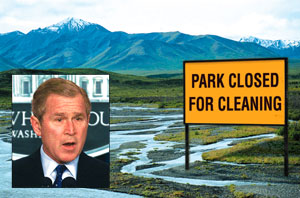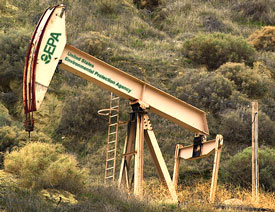|

|
| Above: Alaska's Denali National Park, one of the many wildlife refuges temporarily closed by Bush (i |
BUSH VOWS TO REMOVE TOXIC PETROLEUM FROM NATIONAL PARKS.
WASHINGTON, DCVowing to "restore
the pristine splendor of America's natural treasures," President Bush Monday unveiled "Project: National Parks Clean-Up,"
an ambitious program to remove all toxic petrochemical deposits from national parks by 2004.
"Places like Yellowstone and
Yosemite were once pure, unspoiled wilderness," Bush said at a White House press conference. "But over the course of the past
10 million years, we have allowed them to become polluted with toxic fossil-fuel deposits, turning a blind eye to the steady
build-up of vast quantities of dangerous pollutants. It's time to end this terrible neglect."
Continued Bush: "A comprehensive
survey of our parks, conducted by a team of top geologists specially commissioned by me, has discovered giant pockets of petroleum,
coal, and other 'fossil poisons' beneath an alarming 38 percent of our national parks' surface area. Though a majority of
these poisons are buried under several million tons of rock strata, should they ever seep to the surface and spread into the
surrounding areas, they would spell disaster for the parks' precious ecosystems."
To underscore the severity
of the crisis, Bush produced a chart illustrating survey results for Yellowstone National Park, where a "staggeringly huge"
toxic-petroleum deposit was discovered.
"This amount represents the
equivalent of 40,000 supertankers worth of oil," said Bush, gesturing toward a line on the chart. "To put the dangers into
perspective, consider this: If these 'petro-poisons' should ever spill out into the park itself, the resulting environmental
disaster would be 40,000 times worse than the damage caused by the wreck of the Exxon Valdez."
"We cannot allow such a thing
to happen," Bush said. "We must remove this oil now, before it's too late."

|
| Above: An EPA oil-removal pump begins preliminary cleaning of Kings Canyon National Park in Californ |
Under the Bush plan, 7.2 billion
tons of toxic petroleum would be removed by the target date of January 2004. Unlike other federal environmental clean-up initiatives,
administration officials say the plan would pay for itself, offsetting costs through the sale of petroleum byproducts produced
as a result of the clean-up process.
The clean-up, EPA chief Christine
Todd Whitman said, may even prove profitable, a prospect that has attracted the participation of private industry. Already,
many U.S. companies have expressed interest in lending assistance, and it is hoped that these companies will carry out much,
or perhaps all, of the clean-up effort.
Though "Project: National
Parks Clean-Up" represents Bush's first major environmental initiative since taking office, supporters are quick to point
that he has been a longtime champion of petroleum removal.
"As governor of Texas, Bush
fought tirelessly to protect the state's subterranean environment through a series of massive petrochemical-deposit clean-up
projects," Secretary of the Interior Gale A. Norton said. "Under his governorship, more tons of petroleum-based subterranean
environmental contaminants were removed in Texas than in all the national Superfund clean-up sites combined. The Democrats
talk a good game about the importance of cleaning up the environment, but when it comes to actually eliminating the threat
of enormous oil deposits lurking under the surface of our nation, no one can hold a candle to George W. Bush."
Thus far, reaction has been
mixed. Some have said it is unrealistic for the president to try to remove so much petroleum so quickly. Others, such as Sen.
Bob Smith (R-NH), have charged that the president is caving in to pressure from environmentalists, arguing that the government's
energies would be better directed toward improving the military.
But despite such criticism,
Bush stressed that the urgency of removing the oil deposits should take precedence over everything else.
"Nothing is more important
than the legacy we leave future generations," Bush said. "The costs of this project pale in comparison to the importance of
safeguarding our planet's ecosystem. Our primary mission must be to protect and foster our nation's most precious natural
resource: oil. I mean, the environment."
|

